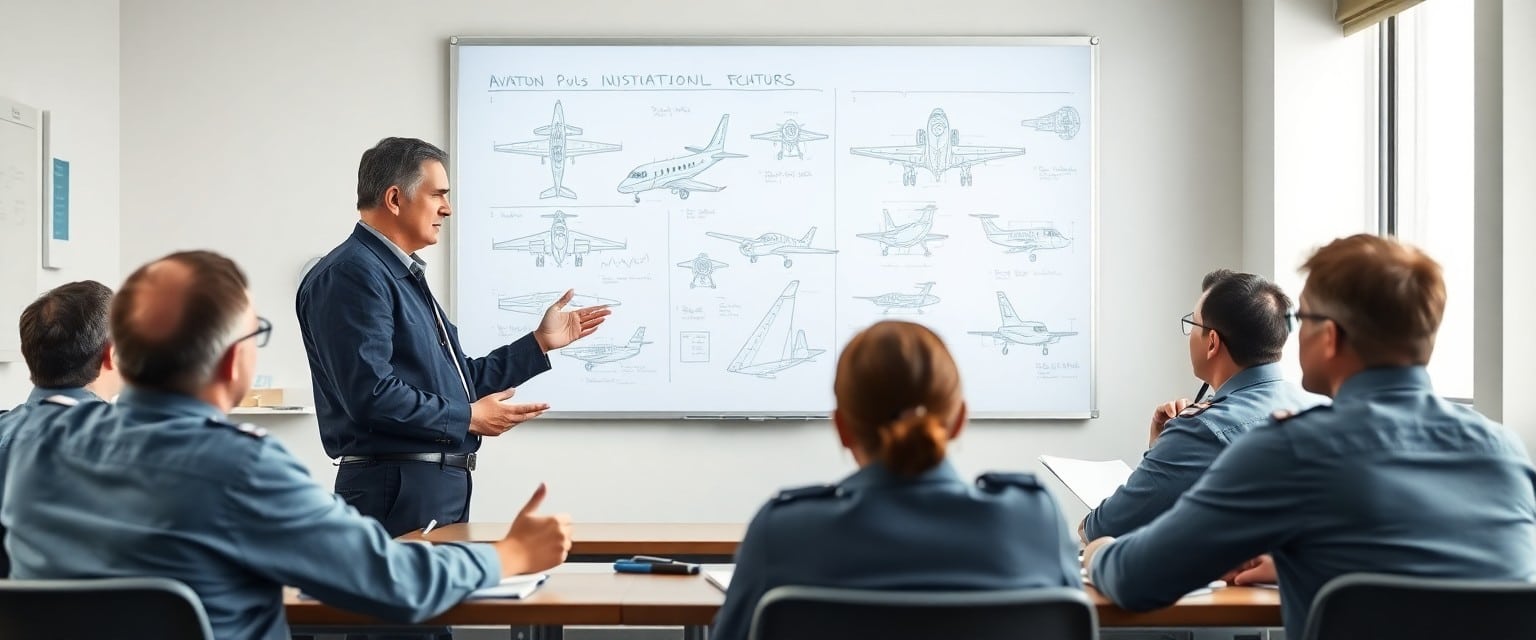Becoming an Airline Pilot
What to Expect During Your ATPL Theory Exams
Exams for your ATPL theory represent one of the most challenging milestones in your pilot training journey. You will face a structured syllabus covering multiple subjects, each demanding thorough understanding and sharp recall. The exam formats often include multiple-choice questions designed to test both your knowledge and decision-making under pressure. While the volume of material can seem overwhelming, adopting effective study strategies and familiarizing yourself with common pitfalls will significantly improve your confidence and performance. This guide will help you know exactly what to expect and how to approach your preparation for success.
Decoding the ATPL Exam Structure
The ATPL exam structure consists of 14 distinct subjects, each designed to test different competencies crucial for airline pilot licensing. These subjects are examined through multiple-choice questions tailored to assess theoretical knowledge and practical application. Each exam lasts between 75 to 130 minutes, depending on the subject, and passing all subjects independently is mandatory. Using a strategic study approach aligned with this structure helps you manage your preparation efficiently and face the exams with confidence. Knowing how the exams are structured lets you tailor your focus to meet the exact requirements of the entire syllabus.
Core Subjects and Their Weightage
The core subjects of the ATPL syllabus include Air Law, Meteorology, Navigation, and Performance, among others. Air Law and Meteorology exams carry significant weight, reflecting their importance in day-to-day airline operations, while Navigation demands strong analytical skills. Each subject has a specific number of questions and allocated time, influencing your study priorities. Knowing which subjects hold more weight enables you to allocate your study hours more effectively, ensuring a balanced and comprehensive understanding for passing all exams.

Exam Formats and Question Types
Most ATPL exams utilize multiple-choice question formats, featuring single-best-answer and multiple-correct-answer styles. Some subjects include scenario-based questions, testing your ability to apply knowledge practically. You’ll face standardized questions on topics like aircraft performance calculations, meteorological phenomena, and radio navigation systems. Knowing the types of questions and formats aids in developing targeted practice strategies, reducing surprises on exam day and improving your accuracy and speed.
| Exam Subject | Duration (Minutes) |
|---|---|
| Air Law | 105 |
| Aircraft General Knowledge | 130 |
| Flight Planning & Monitoring | 95 |
| Performance | 75 |
| Meteorology | 90 |
Exam formats across different subjects not only vary by question type but also by focus area and difficulty. For instance, the Aircraft General Knowledge exam often includes intricate system-based questions requiring in-depth technical understanding, while Meteorology tests your ability to interpret weather charts and weather phenomena. Practice exams and mock tests simulate these formats, providing exposure to timed sections and the particular emphasis each subject demands.
Knowing these variations helps you create effective revision schedules that mimic real-test conditions, enhancing time management and confidence.
- Multiple-choice questions form the backbone of all ATPL exams
- Scenario-based questions assess applied knowledge and decision-making skills
- Exam durations vary to reflect the complexity of each subject
- Subject-specific formats demand tailored preparation strategies
- Knowing question types and formats sharpens your focus during study sessions
Mastering the Syllabus: Key Areas to Focus On
Your success in the ATPL exams hinges on a deep understanding of several foundational subjects. Prioritize high-weight areas like Air Law, Meteorology, and Aircraft General Knowledge, but allocate extensive study time to subjects such as Flight Planning and Performance, where questions often demand application rather than memorization. Balancing broad syllabus coverage with targeted mastery of frequently tested, complex topics will streamline your preparation and maximize your scoring potential.
The Importance of Air Navigation and Flight Planning
Air Navigation and Flight Planning combine theoretical knowledge and practical application, requiring you to calculate routes, fuel requirements, and contingencies accurately. The exam challenges involve not only using charts and instruments but also integrating weather data and airspace restrictions. Focusing on common problems, like time-speed-distance calculations and alternate aerodrome selection, ensures you’re prepared for questions that test your operational decision-making skills.
Understanding Aerodynamics and Performance
Aerodynamics and Aircraft Performance demand a technical grasp of forces, lift, drag, and how they affect aircraft behavior across phases of flight. Questions often test your ability to analyze performance charts and interpret stall speeds, climb gradients, and weight and balance constraints. This knowledge helps translate theory into practical safety insights during flight operations.
Diving deeper, Aerodynamics covers both steady-state and dynamic flight conditions, including how angle of attack variations influence lift and stall margins. Performance questions might present scenarios requiring calculations of takeoff distance under varying runway conditions or determining optimum cruise altitude for fuel efficiency. For example, understanding how hot temperatures reduce air density and thus aircraft performance can directly affect operational planning. You’ll also encounter case studies based on real incidents highlighting performance miscalculations, strengthening your ability to anticipate and mitigate risks.
Strategic Study Methods for Exam Success
Maximizing your study efficiency revolves around targeting weaker subjects while maintaining consistent review across all 14 ATPL topics. Incorporate active recall techniques, like flashcards and practice quizzes, which improve long-term retention far beyond passive reading. Allocate time for scenario-based questions that mimic real exam challenges. Balancing theory study with application deepens understanding, helping you move from rote memorization to confident problem-solving, a tactic many successful candidates emphasize.
Creating a Dynamic Study Schedule
Design your study schedule with flexibility to accommodate progress and unexpected disruptions. Block study sessions into 60- to 90-minute focused intervals separated by short breaks to maintain high concentration. Cycle through subjects to avoid burnout on a single topic, and set weekly milestones to monitor improvements. For instance, dedicating mornings to heavier science topics like Meteorology and afternoons to lighter subjects like Human Performance keeps content fresh and your motivation high.
Effective Use of Study Groups and Online Resources
Joining study groups and leveraging online platforms exponentially boosts your exam readiness. Collaborative learning allows you to clarify doubts instantly, exchange mnemonics, and tackle complex regulations or procedures together. Several ATPL candidates report a 20-30% improvement in retention after regular group sessions. Online forums and question banks, like those on AviationExam or Gleim, offer thousands of up-to-date multiple-choice questions mirroring the exam format, helping you identify common traps and reinforcing concepts efficiently.
Beyond peer discussion, online resources give you access to structured mock exams simulating real ATPL timed conditions, enabling you to build exam stamina and assess pacing. Study groups can also expose you to diverse problem-solving approaches, encouraging analytical thinking vital for subjects like Air Law and Navigation. Platforms offering detailed answer explanations strengthen your understanding of exam rationale, reducing errors caused by misinterpretation. Incorporating both live collaboration and digital tools creates a balanced, immersive learning environment driving confidence on exam day.
Common Pitfalls and How to Avoid Them
Navigating the ATPL exams, many candidates underestimate the scope of detailed regulations and technical data, leading to frequent mistakes like misinterpreting questions or neglecting time management. Overreliance on rote memorization without understanding core concepts often backfires during scenario-based questions. You can prevent these setbacks by regularly practicing with mock exams under timed conditions and reviewing explanations thoroughly. Emphasizing comprehension over memorization and developing a disciplined study routine will minimize errors and improve overall confidence during the exam.
The Most Frequent Missteps by Candidates
A common error involves rushing through calculations or reading questions too quickly, causing simple mistakes that cost valuable points. Many students also overlook weaker subjects, assuming stronger topics will carry their results, which rarely works with ATPL’s balanced scoring. Inadequate use of exam aids like the ICAO phraseology guide or not cross-referencing charts under exam conditions often leads to avoidable slips. You can outsmart these by allocating study time proportionally and simulating exam environments frequently.
Strategies for Managing Exam Anxiety
Anxiety can impair your ability to recall information and process questions quickly during the ATPL exams. Techniques like controlled breathing, visualization of success, and chunking study sessions into manageable blocks help maintain focus. Setting realistic expectations and framing practice exams as learning opportunities reduces performance pressure. In addition, getting familiar with the exam center and routine, such as arriving early and organizing materials beforehand, puts you in control and eases nerves.
Beyond in-the-moment techniques, structuring your preparation with consistent, short study intervals helps keep stress at bay. For example, applying the Pomodoro method—studying for 25 minutes followed by a 5-minute break—supports sustained concentration without burnout. Building physical exercise and adequate sleep into your daily schedule promotes mental resilience, which directly influences your exam performance. Finally, discussing your anxieties with peers or mentors often reveals new coping strategies and reinforces a supportive mindset important for success.
Insights from Those Who’ve Conquered the ATPL
Hearing directly from pilots who have passed the ATPL theory exams reveals patterns in effective preparation. Many emphasize consistent daily study sessions over cramming, complementing official materials with question banks and aviation forums. The diversity of subjects demands adaptable strategies, and successful candidates highlight mastering exam formats and timing as a key edge. Assume that integrating peer advice and real exam experiences into your study plan can greatly improve your focus and confidence during test day.
Testimonials from Recent Exam Passers
“Allocating at least two hours daily and cycling through all 14 subjects weekly helped me build retention,” shares a recent passer. Another notes how tackling mock exams under timed conditions exposed gaps you might overlook when casually reviewing. Many also stress the value of support networks through online pilot communities or study groups, providing motivation and clarity on complex topics. Assume that tapping into these shared experiences sharpens your understanding of ATPL exam content and reduces test anxiety.
Lessons Learned and Tips for Future Candidates
Successful candidates often warn against over-reliance on a single resource; diversifying study materials ensures better grasp of tricky subjects like Performance or Meteorology. Time management during exams affects outcomes significantly, so practicing with timed tests is repeatedly advised. Many found summarizing key formulas and concepts into flashcards useful for quick reviews before exams. Assume that proactive engagement with the exam format, combined with early scheduling of mock tests, heightens your chances of clearing all modules efficiently.

- Start with subjects you find most challenging to build confidence early on
- Utilize a mixture of official syllabus books, question banks, and simulation software for well-rounded preparation
- Regularly review past exam questions to familiarize yourself with question styles and topics emphasized
- Set interim goals that divide the heavy syllabus into manageable milestones
- Establish a study group or online forum interactions for peer support and resource exchange
Assume that cultivating a disciplined routine and balancing various study tools optimizes your preparation and reduces the pressure of the ATPL theory exams.
Final Words
From above, you can expect your ATPL theory exams to be challenging yet manageable with the right preparation. Understanding the syllabus structure and exam format will help you focus your studies effectively. By using recommended materials and following a well-organized study plan, you increase your chances of success. Stay consistent, practice past papers, and be mindful of common pitfalls. Your dedication will turn this demanding phase into a stepping stone toward your professional pilot career.
Frequently Asked Questions about ATPL Theory Exams
How many subjects are included in the ATPL theory exams?
The ATPL theory exams typically consist of 14 subjects under EASA guidelines, including Navigation, Meteorology, Air Law, Human Performance, and Aircraft General Knowledge, among others.
What is the pass mark for ATPL theory exams?
The pass mark for each ATPL theory exam under EASA rules is 75%. For FAA exams, the standard passing score is usually 70%.
How long is an ATPL theory exam valid?
Under EASA regulations, once you successfully pass all ATPL theory exams, results remain valid for 36 months to commence your flight training and complete the required practical tests.
How many times can I retake an ATPL theory exam?
You may retake each ATPL theory exam up to four times under EASA guidelines. After the fourth unsuccessful attempt, you must restart the entire exam series.
Can ATPL theory exams be done online?
No, ATPL theory exams must be taken at authorized examination centers under strict supervision to maintain testing integrity.

